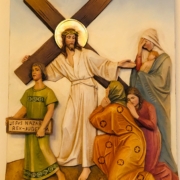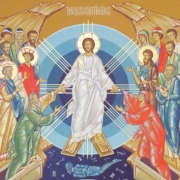
We all like to receive presents, especially those in pretty wrapped boxes. Our curiosity plays with our emotions; could the gift be a key to a new car, a book, piece of jewelry, a new garment, or gift card to a favorite restaurant. However, what if the box were empty? Wouldn’t we be disappointed, puzzled? Perhaps not if we had anticipated something bad was in the box like insects or rotting food? In this case, we’d feel relieved.
An incident was reported in a newspaper about a car which had driven off the road and into a canal. A passing motorist noticed the car’s headlights and called 911. The police came and ran the license tag number to find the name of the owner. The woman who owned the vehicle turned out to be the mother of the driver who had used her car to drive to work that evening. When she arrived at the site of the accident, she stood in horror awaiting to see the lifeless body of her son. Finally, the car was pulled out of the water and rested on the bank, but there was no body in the car. However, minutes later, the young man was found on the opposite side of the canal; somehow he had managed to release himself from the car and swim to safety. The ecstatic mother rejoiced in the good news.
On that Easter Sunday morning, the women rejoiced to find an empty tomb, and they ran and told all their friends the good news. Jesus’ empty tomb is good news for us too. Because His grave was empty, we know ours will be empty too, except for the lifeless body we leave behind when we join Him in heaven to live forever. The Lord is risen indeed. Alleluia.
NOTICES for this week
- View Good Friday & Easter Sunday Mass – a video will be posted on the church’s website, Facebook via our YouTube channel. Don’t forget to subscribe free so that we will in the future be able to retain our site.
- Urgent Message – Please continue to pray for an end to the COVID-19 virus and its victims and thank you for your continued financial support (check, automated bank transfers or electronic donations via com)to the life and witness our congregation in this community.
- In case of a pastoral emergency, you can leave a message on our voice mail, and we will respond as quickly as possible. Please continue to pray for an end to the COVID-19 virus, for its victims, and for those who are working on preventative measures.
Please Pray – For the sick: Carole, Patti, Sandy, Kim, Joe, Steve, Bob, Linda, Francine, Timone, Donna, Ashlyn, Robin. For birthday celebrations: Dale Pugliese, Mike Riddle, Shirley Fenner, Gabriel Falco, Kerry Jackson, Madge Tinglin, Earl Williams. For those celebrating a wedding anniversary: David & Leila South, Walter & Georgette Dzubiak. For the faithful departed, and for our expectant mothers: Dani and Andrea.
Lord Jesus Christ, Son of the Living God, Physician of the body and soul, You restored sight to the blind, healed the lame and cured those with leprosy. Grant, we beseech You, the necessary knowledge and perseverance to all who are working on a vaccine to quickly end the spread of COVID-19. Have mercy on those who have died, and grant comfort to all who are affected in any way and those who are living in apprehension. Give us the grace each day to trust in You and Your loving mercy. We ask this in the name of the Father, the Son and the Holy Spirit. Amen.
https://www.facebook.com/SaintDavidsInThePines/
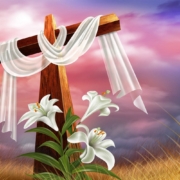
Easter Sunday – Resurrection – 4/12/20
Acts 10:34-43 Peter was the leader of the Twelve and the first to see the risen Lord (Lke. 24-34). Here is part of one of his early sermons, in which it is obvious that the resurrection of Christ is of crucial importance.
Psalm 118:1-2, 14-24 This psalm is “a powerful testimony to the strength of faith that flows from the direct experience of the help of God”. After that introduction, there is the thanksgiving of an individual (vss. 5-21). The portion of this section which we read sounds like the thanksgiving of the risen Lord himself (vss. 18, 22). The latter part of the psalm (vss. 22-29) is the chorus of pilgrims attending the feast. Read on this day, it is an appropriate Easter hymn.
Colossians 3:1-4 The conviction that the risen Lord has conquered both sin and death, is meant to influence all that the Christian is and does.
John 20:1-18 The Easter morning account in John is, first of all, Mary Magdelene’s story. She is baffled by the empty tomb, suspecting foul play, and she is the first to see the risen Lord. Her meeting him in the garden is peculiar to John and is one of the warmest and most touching of all the resurrection appearances. Included is the enigmatic command, “Do not touch me,” and a perplexing reference to his impending ascension. There is no further allusion to the ascension in John, as there is in Luke.
Challenge Questions
- As you read John 20:1-18, put yourself in the place of Mary Magdelene, Peter, or the “other disciple” as they came to the tomb. What did they expect to find, and how do you think they might have felt when the tomb was empty.
- In verse 8, why do you think the “other disciple” believed? We are told in verse 10 that the disciples returned to their homes. How do you think they might have explained what they had just discovered to the others?
- The story continues in verses 11-18. As you read this section, discuss how Mary was finally able to identify the Risen Jesus.
- The meaning of the Resurrection for the early Church and for Peter is expressed in today’s reading from Acts 10:34-43. How would you explain the truth of the Resurrection to someone else?
- How do you think Mary and the other disciples were changed by their experience of the empty tomb? How is your life different because of the events of Easter morning 2000 years ago?
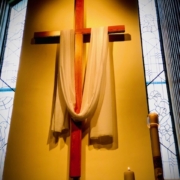

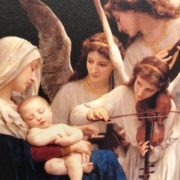
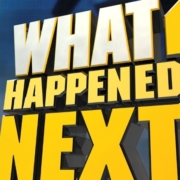
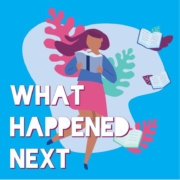

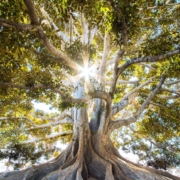

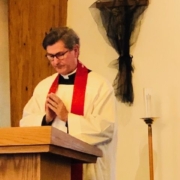
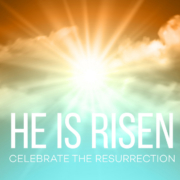


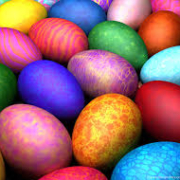
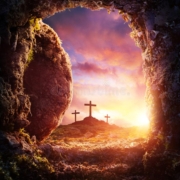 Resurrection of Jesus – The belief that Jesus was raised bodily from the dead by God on the third day after Jesus’ crucifixion and burial, exalting him to the near presence of God in eternal glory. The resurrection of Jesus is at the heart of Christianity (Acts 2:22-36). Christian faith would be meaningless without the resurrection of Jesus (1 Cor 15:14). The reality of Jesus’ resurrection was experienced by chosen witnesses and proclaimed by the early Christian community. Easter is the day of Jesus’ resurrection. Jesus is understood to have been raised on the Sunday following the Friday of his crucifixion. The resurrection is to be distinguished both from resuscitation (restoration to the prior mode of human existence) and the immortality of the soul. Jesus’ resurrection began the transformation and glorification of the whole cosmos, including the redeemed Christian community. Christ was raised as the “first fruits of those who have fallen asleep” (1 Cor 15:20). By Christ’s resurrection, this same new mode of existence is made available to all. The Catechism notes that “By his resurrection, Jesus overcame death and opened for us the way of eternal life” (BCP, p. 850). Jesus’ resurrection is celebrated by Christians at all times, especially at Easter and throughout the Great Fifty Days of the Easter season, and on Sunday, which is the Lord’s Day and the day of resurrection.
Resurrection of Jesus – The belief that Jesus was raised bodily from the dead by God on the third day after Jesus’ crucifixion and burial, exalting him to the near presence of God in eternal glory. The resurrection of Jesus is at the heart of Christianity (Acts 2:22-36). Christian faith would be meaningless without the resurrection of Jesus (1 Cor 15:14). The reality of Jesus’ resurrection was experienced by chosen witnesses and proclaimed by the early Christian community. Easter is the day of Jesus’ resurrection. Jesus is understood to have been raised on the Sunday following the Friday of his crucifixion. The resurrection is to be distinguished both from resuscitation (restoration to the prior mode of human existence) and the immortality of the soul. Jesus’ resurrection began the transformation and glorification of the whole cosmos, including the redeemed Christian community. Christ was raised as the “first fruits of those who have fallen asleep” (1 Cor 15:20). By Christ’s resurrection, this same new mode of existence is made available to all. The Catechism notes that “By his resurrection, Jesus overcame death and opened for us the way of eternal life” (BCP, p. 850). Jesus’ resurrection is celebrated by Christians at all times, especially at Easter and throughout the Great Fifty Days of the Easter season, and on Sunday, which is the Lord’s Day and the day of resurrection.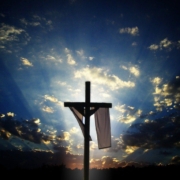 Easter – The feast of Christ’s resurrection. According to Bede, the word derives from the Anglo-Saxon spring goddess Eostre. Christians in England applied the word to the principal festival of the church year, both day and season. 1) Easter Day is the annual feast of the resurrection, the pascha or Christian Passover, and the eighth day of cosmic creation. Faith in Jesus’ resurrection on the Sunday or third day following his crucifixion is at the heart of Christian belief. Easter sets the experience of springtime next to the ancient stories of deliverance and the proclamation of the risen Christ. In the west, Easter occurs on the first Sunday after the full moon on or after the vernal equinox. Easter always falls between Mar. 22 and Apr. 25 inclusive. Following Jewish custom, the feast begins at sunset on Easter Eve with the Great Vigil of Easter. The Eastern Orthodox Church celebrates Easter on the first Sunday after the Jewish pesach or Passover (which follows the spring full moon). Although the two dates sometimes coincide, the eastern date is often one or more weeks later. 2) Easter Season. See Great Fifty Days.
Easter – The feast of Christ’s resurrection. According to Bede, the word derives from the Anglo-Saxon spring goddess Eostre. Christians in England applied the word to the principal festival of the church year, both day and season. 1) Easter Day is the annual feast of the resurrection, the pascha or Christian Passover, and the eighth day of cosmic creation. Faith in Jesus’ resurrection on the Sunday or third day following his crucifixion is at the heart of Christian belief. Easter sets the experience of springtime next to the ancient stories of deliverance and the proclamation of the risen Christ. In the west, Easter occurs on the first Sunday after the full moon on or after the vernal equinox. Easter always falls between Mar. 22 and Apr. 25 inclusive. Following Jewish custom, the feast begins at sunset on Easter Eve with the Great Vigil of Easter. The Eastern Orthodox Church celebrates Easter on the first Sunday after the Jewish pesach or Passover (which follows the spring full moon). Although the two dates sometimes coincide, the eastern date is often one or more weeks later. 2) Easter Season. See Great Fifty Days.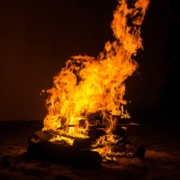
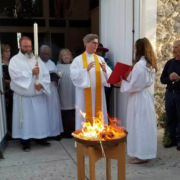 Holy Saturday – The Saturday after Good Friday, which recalls the day when the crucified Christ visited among the dead while his body lay in the tomb of Joseph of Arimathea. In the Episcopal Church there is no eucharist on Holy Saturday. The BCP provides a simple liturgy of the word with collect and readings for the Holy Saturday service. The funeral anthem “In the midst of life” (BCP, pp. 484 or 492) is used instead of the prayers of the people (BCP, p. 283). In the ancient church, those preparing for baptism and perhaps others continued the fast they began on Good Friday. Holy Saturday ends at sunset. Fasting and other preparations end at sunset or with the Easter Vigil, which begins the celebration of Easter. See Triduum; see Easter Vigil.
Holy Saturday – The Saturday after Good Friday, which recalls the day when the crucified Christ visited among the dead while his body lay in the tomb of Joseph of Arimathea. In the Episcopal Church there is no eucharist on Holy Saturday. The BCP provides a simple liturgy of the word with collect and readings for the Holy Saturday service. The funeral anthem “In the midst of life” (BCP, pp. 484 or 492) is used instead of the prayers of the people (BCP, p. 283). In the ancient church, those preparing for baptism and perhaps others continued the fast they began on Good Friday. Holy Saturday ends at sunset. Fasting and other preparations end at sunset or with the Easter Vigil, which begins the celebration of Easter. See Triduum; see Easter Vigil.